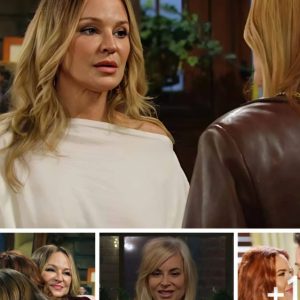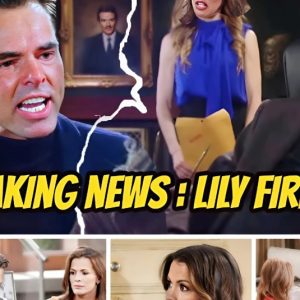In a gripping turn of events on “The Young and the Restless,” Sharon Newman finds herself ensnared in a web of suspicion following Heather Stevens’ murder. Despite undergoing hypnosis to
recover repressed memories, Sharon remains unable to identify the true killer. Facing the looming threat of imprisonment for a crime she vehemently denies committing, Sharon resorts to a
desperate and morally dubious strategy: framing Phyllis Summers for Heather’s death.
Sharon’s Desperation and the Decision to Frame Phyllis
Sharon’s frustration intensifies as hypnosis sessions fail to unlock the identity of Heather’s murderer. With evidence increasingly implicating her, Sharon perceives framing Phyllis—a figure with whom she shares a tumultuous history—as her only recourse. She fabricates a narrative, claiming to have witnessed Phyllis attacking Heather in a fit of rage. To lend credibility to her fabricated memory, Sharon pressures her therapist, Allen, to corroborate her story to authorities, including Nick Newman and Chance Chancellor.
Allen’s Ethical Dilemma
Allen faces a profound ethical quandary. Sharon appeals to his sense of loyalty, asserting that supporting her fabricated memory is essential to prevent a miscarriage of justice. Whether Allen genuinely believes Sharon’s account or succumbs to her manipulation remains ambiguous. Nonetheless, his professional reputation and perceived neutrality render his potential testimony pivotal in influencing the investigation’s direction.
Nick and Chance’s Internal Conflict
Sharon’s allegations send shockwaves through Genoa City, particularly affecting Nick Newman and Chance Chancellor. Nick, entangled in complex relationships with both Sharon and Phyllis, grapples with the plausibility of Sharon’s claims. While he empathizes with Sharon’s predicament, he harbors doubts about Phyllis’s capacity for such violence, given her protective nature toward her loved ones. Similarly, Chance, committed to an impartial pursuit of truth, questions the validity of Sharon’s accusations, especially considering Phyllis’s apparent lack of motive.
Phyllis’s Indignation and Determination
Upon learning of the accusations, Phyllis is incensed. Renowned for her fiery temperament, she confronts Sharon, accusing her of fabricating the story to deflect suspicion. Phyllis’s relationships with her son, Daniel, and Nick become central to her defense, as both men attest to her character and the improbability of her committing such a crime.
The Investigation’s Shift and Sharon’s Mounting Anxiety
Sharon’s accusations compel Chance to re-examine the evidence, scrutinizing Phyllis’s actions on the night of Heather’s murder. As the investigation intensifies, Sharon’s anxiety escalates, acutely aware that any misstep could unravel her deceit. Allen’s role becomes increasingly critical; his support could introduce sufficient doubt to redirect suspicion, while any faltering in his testimony could dismantle Sharon’s entire scheme.
Consequences of Sharon’s Actions
Sharon’s decision to frame Phyllis carries profound implications:
- Damaged Relationships: Her bonds with Nick, Chance, and others risk irreparable harm if her deceit is exposed, challenging their perceptions of her integrity.
- Legal Repercussions: Discovery of her fabrication could lead to additional charges, exacerbating her legal peril.
- Moral Consequences: The ethical breach inherent in framing an innocent person reveals a darker facet of Sharon’s character, raising questions about her capacity to reconcile her actions with her conscience.
The Uncertain Path Forward
Sharon’s audacious maneuver to accuse Phyllis is fraught with risk. Success might temporarily divert suspicion, but the attendant costs—strained relationships, potential legal consequences, and moral degradation—pose significant threats. As the true perpetrator remains at large, Sharon’s intricate web of deceit may ultimately ensnare her, leading to a downfall of her own making.
For a visual breakdown of this unfolding drama, you might find the following analysis





